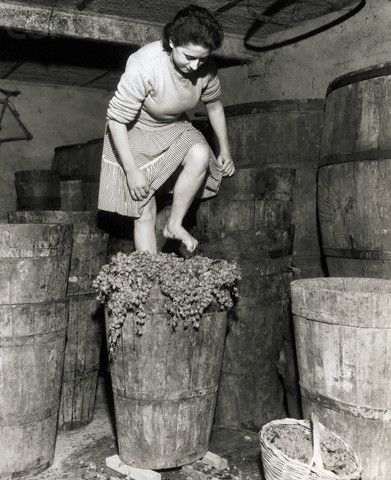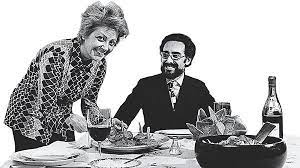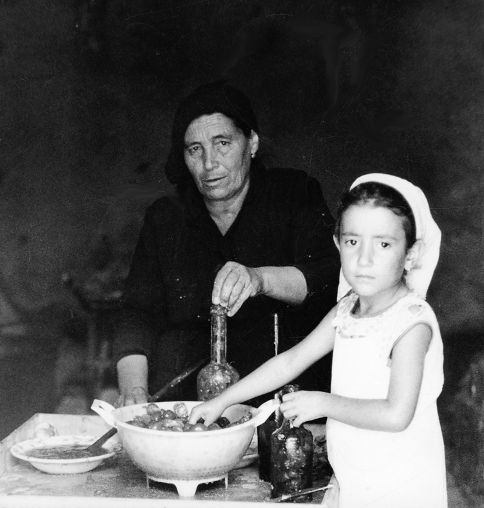When studying food, it is almost imperative that you address the roles that women have in its creation and consumption. Throughout history, women have assumed or been given the role of cook, feeding not only their families but entire communities. In Italy, this role has been folded into women’s personal lives, creating a pathway for them to forge their own traditions and identities. Whether these women are living pre-Risorgimento or during Mussolini’s regime, Italian women have found power and influence in the kitchen they would have otherwise been denied.
In Mary Grace-Fahrun’s book Italian Folk Magic: Rue’s Kitchen Witchery, she explains that to an ignorant eye, housework done by Italian women may appear as just that, a chore assigned to women to keep them busy. However, as was revealed by the matriarchs of the author’s family, it was anything but. Housework, especially cooking, hides a rich and complex world of rituals and customs practiced by Italian women going hundreds of years back. Cooking is intrinsic to the lives of these women, the preparation of food so connected to them that it is affected by the rhythms of their bodies. When interviewing her aunt the author was given a warning about a dish, saying:

“But don’t make this on your period; it won’t turn out.” “But why?” I would ask. “Because there is too much power in your hands; it will ruin this delicate dish. During that time of the month, make brodo (broth) or braise tough meats. The power in your hands will toughen tender filet, but it will tenderize the toughest meats” Then her voice dropped to a whisper: “Your other aunt is in menopause. That’s why her braciole is so tough.'” (2)
Women have found seats of tremendous influence in their kitchens. When Pellegrino Artusi released his book, La Scienza in Cucina, that changed the way that Italy saw itself and its food, its core demographic was middle class women. This group would have a major hand in the shift that followed in this books wake. Their influence and power was hidden behind their aprons and pots, the unassuming leader of the Italian people. This is not the last time their influence would be used as a tool for social change.
During Mussolini’s fascist regime, he recognized the power that women had as citizens, consumers, and cooks; citing the way Artusi’s book filtered through women, its affects then diffusing to the rest of the population. Their duties during fascism came first as mother and wife, Mussolini appointing women as the “director of the household” (Victoria De Grazia, How Fascism Ruled Women, 101). This position was held at a very high regard in propaganda released by the regime. It encouraged women to conserve and recycle food whenever possible. The ideal fascist kitchen would be stocked with Italian grown products and economize time and resources. Alongside this, the modernization of kitchen tools was becoming readily available to average citizens. Streamlined technology freed up women’s time to focus on serving the state rather than working tireless hours in the kitchen.

Something else that Mussolini pushed was the creation of more Italians. Wanting to grow the empire, he encouraged women to have more children and focus their energy on their motherly duties. New kitchen technology and a shit of focus off elaborate time consuming dishes typically prepared by Italian women to simple conservative dishes gave women time that they would not have had otherwise. This time was used to make and raise babies (Lo Weis, Tasting Fascism: Food, Space, and Identity in Italy). By changing and manipulating women’s roles especially in the kitchen, Mussolini was able to use women to further his own ideals. Food was something that got in the way of the goals of the Italian government. By removing women from the kitchen, he is taking them out of their power and into a more subservient biological role as mothers and caregivers, and in turn making them easier to govern.

When women enter the kitchen, they step into a space of generational power. A place so powerful, that in order to push his authoritarian ideas, Mussolini had to separate women from it. Years after the war, Marcella Hazan discovered the security and power of the kitchen. Newly arrived in America as a non-English speaking Italian immigrant, Hazan turned to the kitchen to stabilize herself and find confidence in a new and unfamiliar place. She was not a cook during her childhood, nor was she trained as one, attending school for anatomy and biology. She was drawn to food at a time when she felt powerless and small, unable to speak the language or navigate the crowded foreign streets of New York City. When she cooked, she did not use any cookbook or list of recipes, rather she used her memory. She knew what to do to mimic the tastes of her childhood, of the familiar environment she had left. She felt what she needed to do, and she did it. The kitchen became a place where she could find the stability and power that felt lacking from her life as a new arrival in America (Amarcord: Marcella Remembers).
When I look back on my relationship to cooking I find it plays a similar role. Since I was a little girl, cooking was shown to me as a means of comfort and a way to ground myself. In high school, when I was struggling with an eating disorder, I would cook meals for my family. Even though everything in my mind was telling me food was the enemy and should be avoided, I could not stay away from at least cooking it, what I now see as my unconscious drive to heal. In my journey of healing my relationship with food and my body, cooking has played a major role. It is easy to feel powerless in the face of an eating disorder and stepping into the kitchen to find agency over my own body and food has given me the stable footing to feel more empowered. I leaned harder on cooking last year when the pandemic hit, finding control in cooking dishes that were familiar and comforting. Food continues to be my strongest shield against perceived internal and external threats. Creation is a powerful thing and turning to that, especially as a woman, feels like returning to something sacred and powerful. To say that women should cook as often as possible feels iffy to me, especially as a feminist. But, when you look at it stripped down, devoid of patriarchal influence, the kitchen is a temple, an art studio, a womb. It is a sacred and ancient seat of power that women have been using to heal themselves and their communities for hundreds of years. As a woman, being called to cook does not feel like me following any sort of societal expectation, but rather I am listening to the same instinct that Hazan followed, that the women of Mary Grace-Fahrun’s family lean into, that Mussolini was so eager to crush. Cooking as a woman is an act of healing and resistance, one that brings deep rooted comfort and strength.

Be First to Comment